
[EDRM Editor’s Note: EDRM is proud to publish Ralph Losey’s advocacy and analysis. The opinions and positions are Ralph Losey’s copyrighted work. All images in the article are by Ralph Losey using AI. This article is published here with permission.]
Imagine instantly accessing a room full of top experts ready to respond to your toughest questions, brainstorm creative solutions, or critique your new ideas, all without spending a dime. Whether you’re a seasoned attorney navigating complex cases or simply someone eager for reliable insights, the Panel of Experts for Everyone About Anything puts a diverse panel of AI-generated experts at your fingertips. Curious how this game-changing tool and others like it work? Read on.
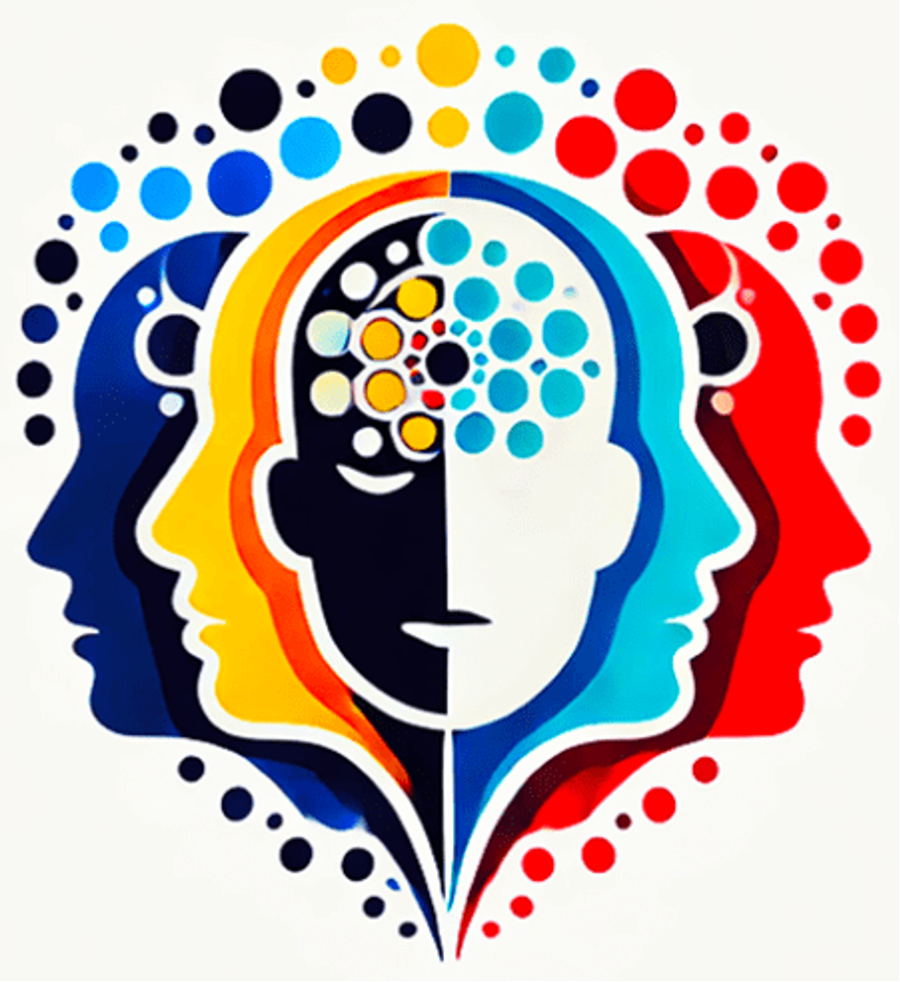
Overview and Purpose
Consulting experts are a great help for anyone trying to do something new or difficult, including attorneys. Yes, you could google and watch videos, or hire human experts, but now there is a better, more reliable way, and it costs nothing. That is a big deal for lawyers where consulting experts can be a major expense. To address this, we’ve developed a Custom GPT AI that’s free and available to everyone, literally a Panel of Experts for Everyone About Anything. This innovative AI tool provides easy access to consultations by knowledgeable experts in every field. It’s like having a pocket full of polymaths, plus the best specialists and mechanics in any trade.
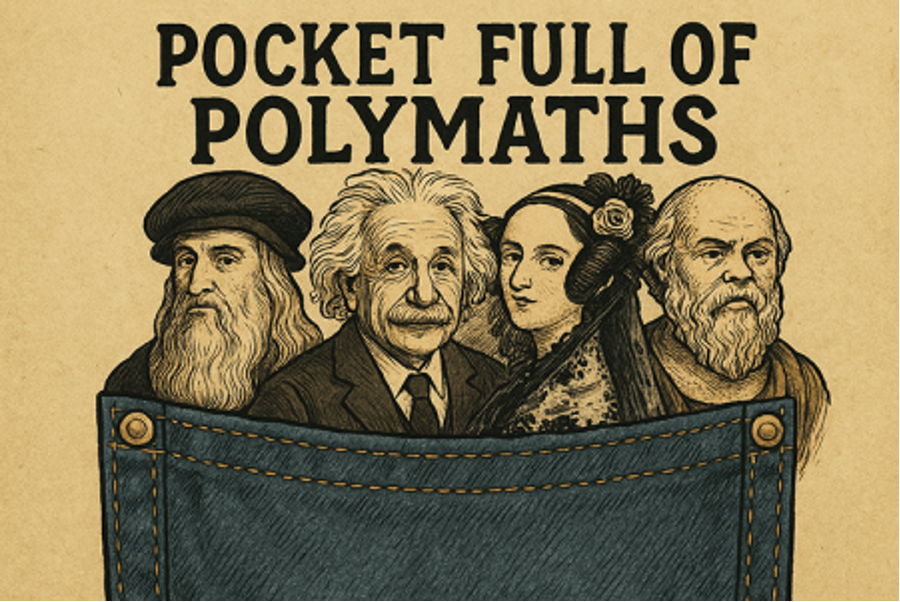
It is a game changer for any lawyer to have instant access to a team of consulting experts. Consider two obvious examples, personal injury (PI) cases and development deals. PI matters usually require medical and vocational experts, accident reconstruction experts, etc. Development transactions usually require the input of architects, engineers, builders, etc. In fact, in today’s complex tech world, it is hard to think of any legal matter that could not benefit from expert input of some kind.
That’s where the Panel of Experts for Everyone About Anything comes in. The AI is independent and has no particular agenda or monetary incentives. The experts suggested by the AI are not recommended based on advertising money or rigged rankings. Moreover, you get the final decisions on experts and can, if you’d like, designate your own expert types. It makes instant expert consultations easy. You get to see a variety of expert opinions, not just one, on any issue.
There is only one expert persona that we always placed on every panel, and the only expert that our software does not allow you to exclude: the Contrarian. Two and one-half years of testing have shown that the contrarian is indispensable. This AI, also known as The Devil’s Advocate, is designed to be critical of the other expert’s opinions, highlight potential biases, and identify weaknesses or errors in other opinions. Sometimes this expert can be overly skeptical (and grouchy), and you may want to disregard him. Still, it is good to hear what this little devil says. The feature is especially useful for lawyers who must rigorously scrutinize expert testimony.
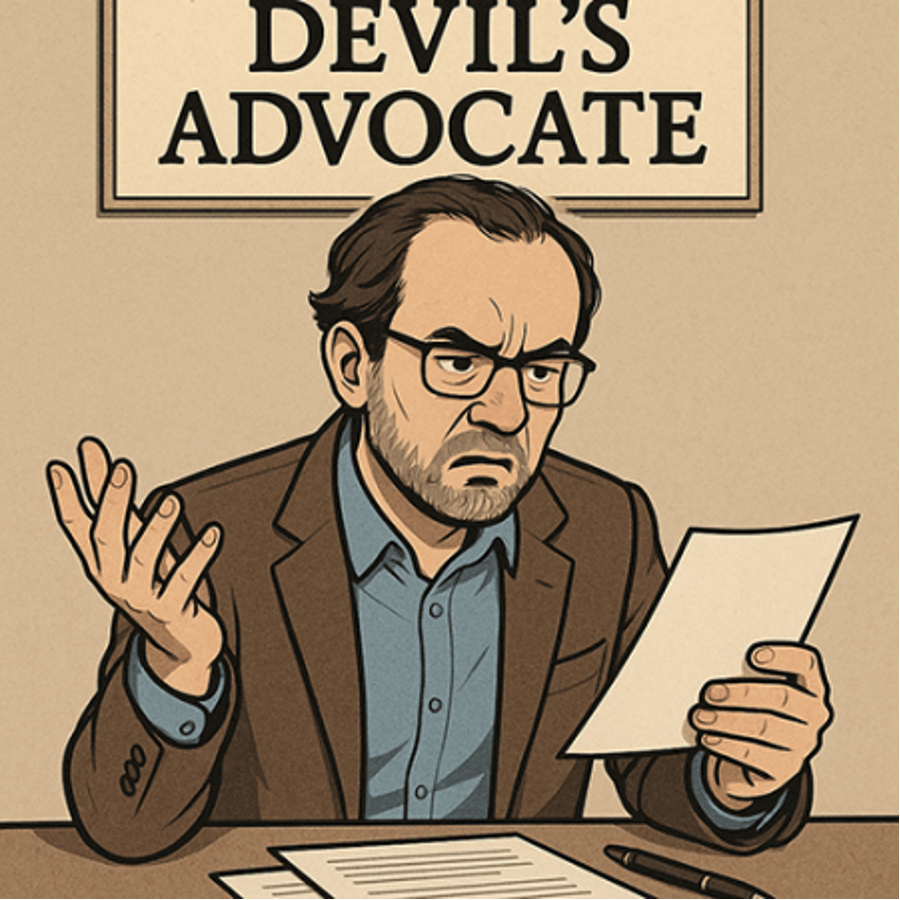
This Open AI driven software is more than just an expert consultation device. It is equally useful for general queries, self-education, strategic problem-solving, brainstorming, and exploring creative solutions. The AI-generated multiple-expert format surpasses traditional search engines by providing coherent, diverse, and ad-free advice in a confidential environment.
Equal Access To Justice
The Panel of Experts for Everyone About Anything is a free application. It does not even come with ads or other monetization. Why? Ralph must get a little personal to answer that. He’s enjoyed a long career as a practicing attorney and is happy to be 74 and still have skills. He knows there are many things more important in life than money. This is his way of payback, a kind of pro bono work. Not exactly Bill Gates level but you do what you can.

This app is designed to help democratize access to expert advice across all subjects. We believe this can have a positive impact on the law and the common ideal in all democratic countries of equal access to justice. See e.g.: Nicole Black, Access to Justice 2.0: How AI-powered software can bridge the gap (ABA 1/24/25). This is especially significant in law when one side in a dispute has the advantage of costly expert consultations, and the other side does not. This is typical in asymmetric litigation. This Custom GPT helps level the playing field. See e.g., Joel Bijlmer, Is AI Capable of Leveling the Legal Playing Field? (Legal Wire, 9/23/24). Ralph admits to often having had the benefit of easy access to experts and knows full well the edge it provides.
While the software won’t write cross-examinations of experts or legal memoranda (there are other apps for that), it can provide insightful ideas, strategic directions, and valuable perspectives that can facilitate these legal tasks. For instance, it can suggest critical points to raise during cross-examination or identify important considerations for structuring legal memorandums.

Introduction to Software Features
The Panel of Experts for Everyone About Anything can apply to any subject and work for a diverse range of users, including consumers. It is not just limited to use by legal professionals. It is designed to use OpenAI Custom GPT software to harness AI’s surprising ability for AI to split into multiple personalities and talk to itself using these personas. They can even be prompted to debate, argue, or collaborate on problems that we put to them.
When OpenAI first released its software (Chat GPT3.5 on November 30, 2022) it had no idea generative AI software could do this. No one did — until users started experimenting. I was lucky to get in on the first wave and have been fascinated with this ability ever since. This multi-mind persona interaction ability dramatically improved in version 4.o – Omni, in 2024. For background see ChatGPT’s Surprising Ability to Split into Multiple Virtual Entities to Debate and Solve Legal Issues (e-Discovery Team, 6/30/24).
As of late June 2025, the latest OpenAI models substantially improve the multi-persona interaction capabilities, reliability and insightfulness. However, despite these improvements, the technology is not infallible as discussed further below in Trust But Verify.
For those seeking quick and straightforward advice, the simpler companion GPT, Magic Rolodex of Experts, is also available, again free. We would not recommend the Magic Rolodex for legal use, but is great for most consumer questions, especially when you can’t get a free plumber on the phone to talk to, and things like that. It beats googling anyway.

Magic Rolodex was updated alongside the Panel of Experts for Everyone About Anything on May 30 and June 20, 2025. The latest updates enable users to select specific OpenAI models, further enhancing customization and precision.
How to Sign-On the Expert Panel
The Panel of Experts for Everyone About Anything and its little brother, Magic Rolodex of Experts, can be found through links provided here and on the OpenAI store. You have to be signed on to ChatGPT, either a free or paid version, for any of these links to work or to use any custom GPT. Don’t have a ChatGPT account yet? Click here to create one (free). There is no additional sign on requirement for the app itself, since it is a free public app.
For purposes of preserving the confidentiality of your queries, we always recommend you purchase an OpenAI subscription, where the starting entry level is now $20 per month. The paid subscriptions guarantee privacy so purchase is, in our opinion, an ethical requirement for any attorney who wants to try it in their practice.
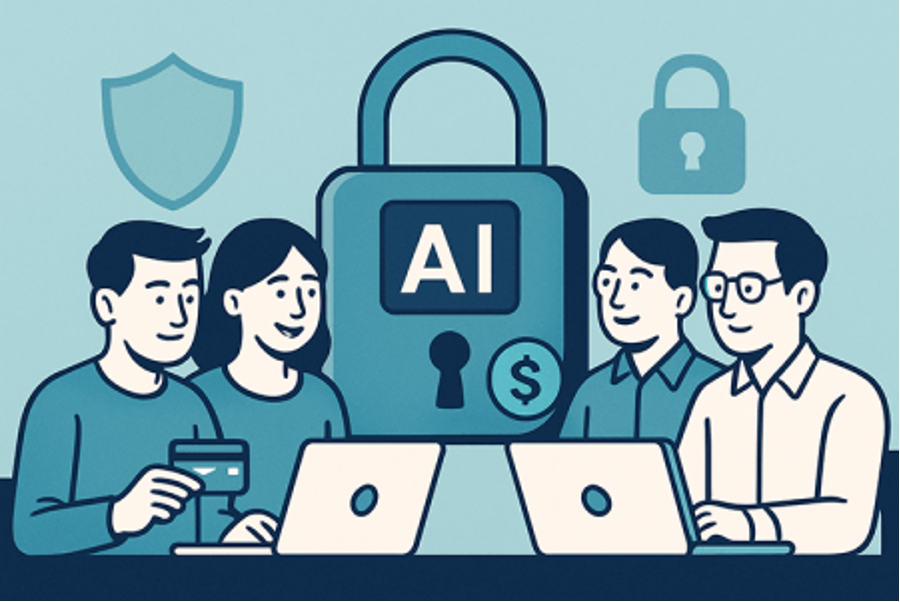
Most of the Custom GPT software we have created are meant for personal or other non-legal use and are free. See e.g. the Custom GPTs page on Losey.AI; or search “Ralph Losey” on the ChatGPT store. One of our favorites is a tool created for illustrations on blogs called Visual Muse. We also have a couple of specialized GPTs designed exclusively for legal professionals, including Panel of AI Experts for Lawyers (private, password protected). This is a complex tool, with five AI experts and six mandatory rounds of carefully choreographed internal AI discussion. It requires initial training and ongoing support and is intended for legal professionals only. It has far more firepower than most attorneys will even need.

How to Use the Expert Panel
The Panel of Experts for Everyone About Anything is simple to use and requires no advance training or support. Simply ask a question, pick the experts you want from those suggested, and you should get the results you need. The software uses a little of our special programing procedures but mainly relies upon the initial LLM training to generate its expert responses. It also draws upon improvements of the post-training algorithm improvement OpenAI model itself, which, among other things, now allows you select to run the Custom GPT. (More on that and it will also be obvious when you use.)
The software always provides four default starter prompts to guide your initial interaction, or you can simply state your topic or issue directly. The app is designed to ask clarifying questions if your intent isn’t immediately clear, ensuring the expert panel addresses exactly what you need. This need can then be clarified and revised as the chat conversation continues. You can change the subject entirely if you want, even in the middle of the conversation. Here are the four conversation starters we currently use:
- Got a thorny problem, novel idea, or strategic choice? Tell us your goal—do you want to brainstorm, compare, troubleshoot, or critique? We’ll assemble a panel of diverse experts to dig in.
- Not sure where to start? Type any topic (AI hiring, quantum patents) and we’ll help frame the question.
- Upload a document and tell us what to do with it. Need a summary, issue-spotting, legal critique, or creative angle? Drop the file here, and we’ll tailor the panel’s scope and style to your needs.
- Want the panel to match a specific audience or format? Just tell us who it’s for—like audience=judges—or how you want it written—like format=IRAC or depth=Quick. We’ll shape the tone, style, and expert mix to fit.
Here is what the opening screen looks like.
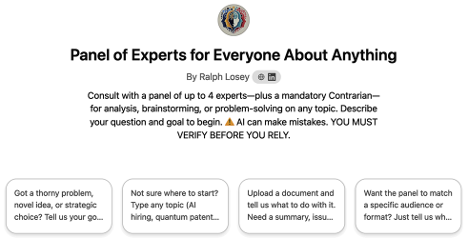
You can click one of these four buttons to start the session or just enter your prompt.at the bottom of the screen.
In addition to the generative AI capabilities of the Open AI models, the Panel of Experts can draw upon the following capabilities:
- Data Analysis. You can attach files or images to submit to the GPT to help clarify your topic and help the GPT to suggest the best experts for your problem.
- Web Browsing. The Panel can also go online to browse for information. This is important if you ask about any current topic with important events after ChatGPT’s last training date.
- Image Generation. It has access to the image generation abilities too. Sometimes it sometimes helps to have images to illustrate the topic.
- Code Interpreter. It can also generate Python code where necessary (rare), but it is not intended as a software advisor. A specialty code GPT would be better suited for that.
Most of the time you won’t need these extra capabilities, but it is good to know they are there.
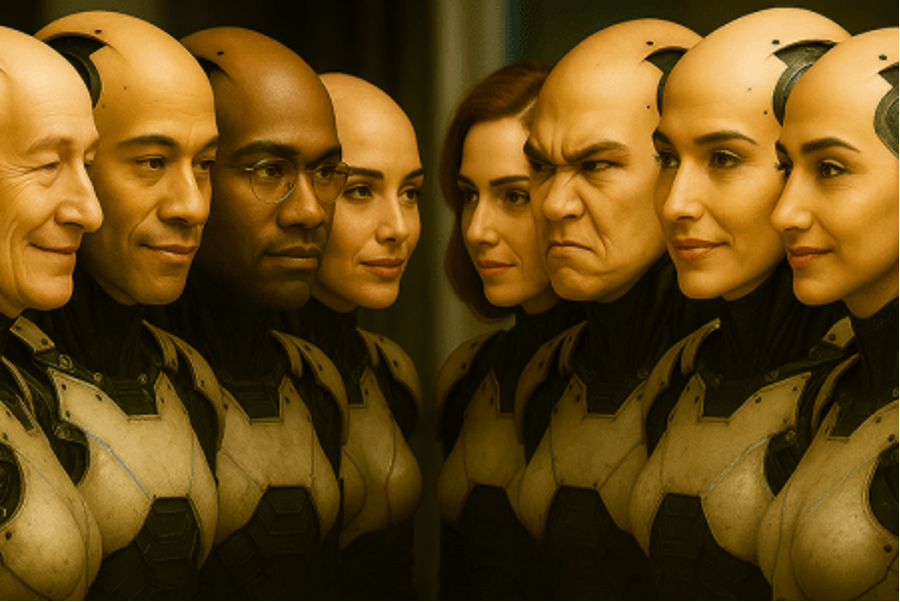
Trust But Verify
As of June 2025, the new models of OpenAI have significantly improved the ability of the AI multi-mind persona analysis. It is far better than ever before, amazing really, but it can still make mistakes. You can trust it, but you must still verify with your own judgments and that of recognized human experts on topics of importance, such a trial testimony or legal topics. (It is not designed for legal research.)
All AI technology can err, from small errors to big ones. OpenAI in each session explicitly reminds users to verify AI-generated information. Although AI capabilities have greatly improved since 2023, independent human validation remains crucial, especially concerning potentially dangerous or high-stakes issues such as medical treatment, financial investments, or critical legal advice. Consult human experts in these scenarios.
We’ve extensively explored AI multi-persona discussions since early 2023 with countless experiments, many of which we have reported. We suggest you try to replicate some of them. First-hand experience is a great teacher and provides insights beyond words alone. To go deep on AI’s capabilities, its risks and benefits, consider reviewing these additional articles:
- Worrying About Sycophantism: Why I again tweaked the custom GPT ‘Panel of AI Experts for Lawyers’ to add more barriers against sycophantism and bias (July 9, 2024).
- ChatGPT’s Surprising Ability to Split into Multiple Virtual Entities to Debate and Solve Legal Issues (June 30, 2024).
- Panel of AI Experts for Lawyers: Custom GPT Software Is Now Available (e-Discovery Team (e-Discovery Team, 6/21/24).
- Evidence that AI Expert Panels Could Soon Replace Human Panelists or is this just an Art Deco Hallucination? Part One (e-Discovery Team, May 13, 2024).
- Experiment with a ChatGPT4 Panel of Experts and Insights into AI Hallucination – Part Two, (e-Discovery Team, May 21, 2024).
- OMNI Version – ChatGPT4o – Retest of My Panel of AI Experts – Part Three (e-Discovery Team, May 29, 2024).
- Omni Version Test of the Panel of AI Experts on a New Topic: “AI Mentors of New Attorneys” – Part Four (e-Discovery Team, June 3, 2024).
- Another Test of the Panel of AI Experts on a Survey of Public Expectations of Generative AI – Part Five (e-Discovery Team, June 7, 2024).
- Types of Artificial Intelligence: Still Another Test of the ‘Panel of AI Experts’ on a Chart Classifying AI – Part Six (e-Discovery Team, June10, 2024).
- Final Test of ‘Panel of AI Experts for Lawyers’ – Bruce Schneier’s Commencement Speech On How AI May Change Democracy – Part Seven (e-Discovery Team, June 13, 2024).
- Prompting a GPT-4 “Hive Mind” to Dialogue with Itself on the Future of Law, AI and Adjudications (e-Discovery Team, 4/11/23).
- ChatGTP-4 Prompted To Talk With Itself About “The Singularity” (e-Discovery Team, 4/04/23).
- The Proposal of Chat-GPT for an “AI Guardian” to Protect Privacy in Legal Cases (e-Discovery Team, 4/15/23).
Also see: Custom GPTs: Why Constant Updating Is Essential for Relevance and Performance (4/22/25); GPT-4 Breakthrough: Emerging Theory of Mind Capabilities in AI (12/5/24); Innovating AI Communication: Real-Time Conversations Between Different ChatGPTs (8/2/24).

Conclusion
In Part Two of this article coming soon we provide a demonstration of Panel of Experts for Everyone About Anything. The demo includes a full transcript of the experts discussion of an interesting NYT magazine article: A.I. Might Take Your Job. Here Are 22 New Ones It Could Give You. In a few key areas, humans will be more essential than ever. It was written by former Wired editor, Robert Capps, and published on June 17, 2025.
We will also demonstrate in Part Two the new feature of selecting a OpenAI model to drive the app. We will start with the 4.5 version, which now requires a high level paid ChatGPT subscription, and then use version 4o, the free version, in the concluding Part Three.
As usual I provide an AI podcast where two young techie AIs share their take on things. Echoes of AI Podcast: Panel of Experts for Everyone About Anything – Part One. Two Google Gemini AIs generated a 14-minute podcast talking about this article. They wrote the podcast, not me.
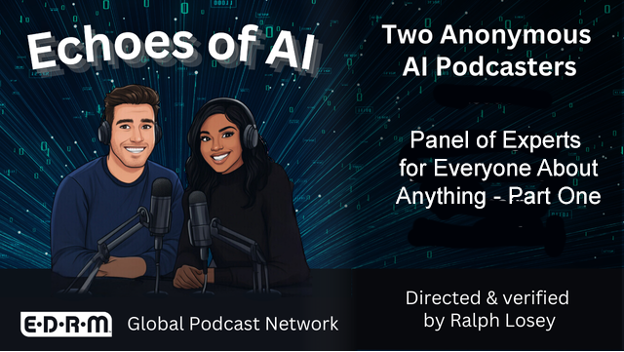
Ralph Losey Copyright 2025 – All Rights Reserved
Assisted by GAI and LLM Technologies per EDRM GAI and LLM Policy.


